Have you ever discovered a life hack just when you needed to hear it? The timing and the solution perfect, and the next step so obvious that you acted immediately and have stuck with it ever since?
When it comes to health, sweeping life changes are especially difficult to implement and even harder to sustain. But in my experience, it’s the small changes you adopt, maintain, and love that add up to a meaningful long-term difference.
I’ve been collecting a list of these kinds of fitness, diet, happiness, and sleep hacks for years. Here, for the first time, are my 43 favorite health hacks.
Fitness Hacks
There’s no doubt one of the best things you can do for your overall health is to make fitness a regular part of your life. In fact, studies have shown that even moderate levels of exercise can increase energy and reduce fatigue, improve your focus and decision-making, and increase your creative potential.
Here’s how to keep yourself motivated and make workouts work for you:
- Follow a consistent workout routine. Research suggests that an early morning workout is best for establishing — and sticking to — an exercise routine. But don’t sweat it if you’re not a morning person. Your body can adapt to training at any time of day as long as you’re consistent.
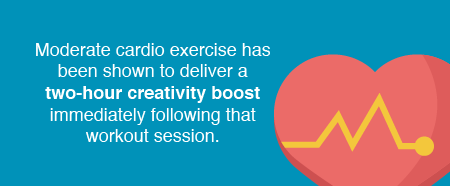
- Go to the gym at off-peak times. Try to avoid hitting the gym at its busiest times when everyone else is using your favorite machines and weights. Exercising during off-peak hours means less waiting, less traffic, and a more efficient workout. (Bonus points if you go midday to boost your productivity at work!)
- Use your own weight for resistance instead. No gym? No problem. Bodyweight exercises involve using your own mass as resistance in a workout. They’re convenient because they require no equipment and can be done almost anywhere. They’re also terrific at building your body’s foundation and can be easily tailored to your personal needs based on the exercise and number of repetitions. Bodyweight exercises are among my favorite, most underrated ways to get a workout in.
- Find solutions to work out while traveling. “I’m too busy traveling” and “I can’t find a gym on the road” are other common cop-outs for skipping a workout. Apps like Gymsurfing (only available in San Francisco for now) point you to the nearest professional gym, and sites like GoRecess share the best nearby fitness classes. Don’t want to leave the hotel? Popular apps like Nike Training Club, FitStar, and Daily Burn will coach you through a workout. GAIN Fitness, Power 20, and Sworkit will generate quick and easy bodyweight routines you can do right where you are—no gym required.
- Try Tabata. Izumi Tabata (my second-favorite inventor of a popular workout after Royal H. Burpee) created the Tabata Protocol, which calls for intense bursts of activity followed by short rests (and then more brief, intense activity). In some cases, its results may equal other training programs of much longer duration. It’s one of my favorite ways to cut down on time and boost efficiency.
- Take a group class. Don’t like going it alone? We can all use some support when trying to start (and stick with) a new training regimen. Exercising as part of a group brings you together with others who are facing the same challenges and can understand your struggles. Try taking a yoga, spinning, or Japanese samurai sword-fighting class. Having a set time to exercise will help keep you on track, and the class and instructor will provide a built-in support system.
- Listen to music. Believe it or not, music isn’t only a cure for boredom; it’s also a way to improve performance, increase motivation, and reduce distraction. The most important aspects of a workout playlist are the tempo and “rhythm response,” or how much a song makes you want to move. Runners tend to prefer music that’s about 160 beats per minute, but the motivational effects seem to level out at 145 beats per minute. To start off, here are the top 10 workout songs (according to Spotify, at least).
- Walk and stand more at work. Research continues to show that prolonged periods of sitting increase obesity, poor posture, and chronic pain. A standing desk at work can help reduce the amount of time you spend seated. If you have weekly meetings, try to conduct them while walking to improve blood pressure and stress (among other awesomeness).
- Get a workout buddy. Just like going to a class, having a friend or co-worker who’s doing the same fitness program can add accountability, encouragement, and fun. One investigation indicated that training with someone who’s more fit than you pays even bigger dividends. Another study found that even a virtual training partner can be beneficial for participants.
- Hire a trainer. Do you have a hard time pushing yourself in the gym? Research shows working out with a trainer can help increase your motivation and intensity during workouts. One study suggests that working with a trainer helps clients increase activity while also improving their attitude. Trainers aren’t always easy to afford, but if you’re committed to the splurge, don’t forget to make sure the trainer is worth the money.
- Put your money where your mouth is. Would you be more likely to work out if your money were on the line? That’s the promise of the Pact app, which helps keep you motivated to accomplish your fitness, health, or eating goals by putting up a small amount of cash to bet on yourself. If you don’t stick to your pact, you’ll be paying other app users who do achieve their goals. A similar community is DietBet, where you commit money and join a larger pool to stick to your weight loss goals.
- Swear a metric sh*t-ton. Strange as it may sound, researchers explored whether swearing when in pain improved pain tolerance. It actually benefited some of the subjects — largely because it induced the “fight or flight” instinct and accompanying physical reactions. Channel your anger into positive goals like reaching new personal records in the gym, but don’t assume it’s healthier to have a potty mouth. A follow-up examination revealed that the more you curse, the smaller the effect it has in reducing pain. So maybe not a “metric sh*t-ton,” but a “U.S.-based short sh*t-ton.”
- Visualize the exercise. Research suggests that simply imagining powering through that final set or finishing that last half-mile can help prepare the body to actually do it. It sounds crazy, but it’s true. Done properly, visualization can help you practice the execution of specific motor movements, improve performance, and even strengthen your intrinsic motivation.
- Enter a race. Signing up for a fun run is effective for establishing a fitness routine because it gives you a concrete goal to work toward and a deadline for achieving it. Check out Active to browse local races. The Color Run is one of my favorites!
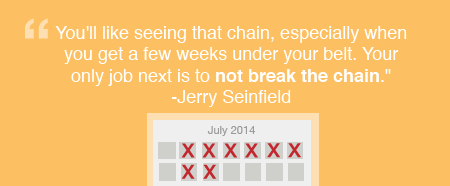
- Try the Seinfeld method. Famous comedian Jerry Seinfeld once revealed the secret he used to become a better comic. Every day he wrote new material, he would make a satisfying red “X” on the calendar. After a while, the chain of Xs was something he felt compelled to continue. Every day that you make it to the gym (or any other habit you’re trying to pick up), make a large red “X” on your calendar to hold yourself accountable and stay motivated.
- Download NudgeMail. It’s probably my all-time favorite free email reminder service that will notify you to train (or anything else, really) whenever you want it to. It’s essentially like sending yourself an email, but you control its future delivery. I use it for everything from paying bills to giving myself a motivation boost every morning.
- Buy an extra pair of underwear to keep at work. Taking the time upfront to think through reasons you don’t follow through with healthy activities will pay off later. In my experience, buying a set of workout clothes to keep at the office, making sure you have a light gym bag, duplicating your toiletries, finding shampoo and deodorant you actually look forward to using, and addressing any other random (but important) excuses now rather than later make a small difference that adds up big time.
Diet Hacks
If you’re trying to lose weight, the truth is that dietary changes almost always have an even bigger impact than exercise. You don’t have to become a vegan or swear off carbs forever to see positive effects, though.
Instead, here are a few simple tricks for eating better:
- Log the food you eat. Studies show that keeping track of your food intake can help you lose weight and keep it off. Tracking calories may be flawed, but it can work. Apps such as MyFitnessPal and Lose It! make it easy. Withings also sells a variety of products to monitor activity, vital signs, and sleep patterns.
- Throw out the junk. Stop everything you’re doing and ditch anything you don’t really want (or need) to eat. If it’s in front of me, I know I’m probably going to eat it. So get that stuff far, far away and instead opt for fresh fruits, veggies, and other nutrient-dense foods.
- Don’t drink your calories. Many beverages have sugars, dyes, and flavorings your body doesn’t need. Even worse, it’s super easy to pour on the pounds by choosing soda, juice, milk, alcohol, and other options over water. Even beverages sweetened in other ways (“zero calories”) are increasingly linked to weight gain. Quitting soda is one of the easiest ways to improve nutrition.
- Substitute cinnamon in your coffee. Rather than cream and sugar, try cinnamon for a flavorful kick to your coffee. Every Starbucks has some. Not only does it have fewer calories than your typical cream, but cinnamon also has numerous health benefits: It can reduce triglycerides, LDL (i.e., bad) cholesterol, and blood sugar levels. It also contains antioxidants to boost the immune system and may even improve brain function. I started putting cinnamon in my coffee years ago and never looked back. #CinnamonLife
- Choose a smaller plate. Science shows that the plate you choose to eat from influences how much you put on it. Switch to a smaller plate, and you could reduce your calorie intake by 20 percent!
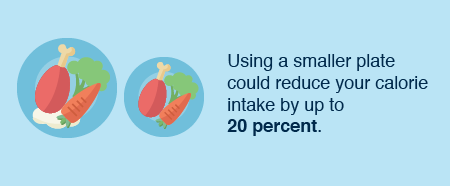
- Choose fresh or frozen over canned. Vegetables, soups, and beans in cans contain higher levels of sodium. In addition, canned fruits are often packed full of excess sugar — negating most health benefits. Frozen fruits and vegetables maintain more of their nutritional value. This can help you get your smoothie, egg scramble, or snack without always shopping immediately.
- Turn off the TV and step away from your computer when eating. Watching TV (and movies or TV shows on your computer) while eating is associated with overeating and poorer food choices. And the unhealthy food and drink commercials don’t help either! So step away, and focus on your meal when you can.
- Replace desserts with fruit. Fruit is generally a much better way to satisfy your sweet tooth than traditional desserts. As an added bonus, fruits can provide fiber and antioxidants, and they can help you avoid the dreaded after-meal sugar crash. It’s also awesome and almost always available as an option when dining out.
- Pace yourself. When we eat quickly, our bodies may not realize how full they are, which causes overeating. Most foods take at least 20 minutes to digest. So enjoy what you have, slow down, pause before you grab seconds, and stop eating when you feel full.
- Stay hydrated. Drinking plenty of water has a surprising amount of scientifically proven benefits. It promotes weight loss by lowering your total energy intake and improving metabolism. An interesting study of soccer players showed those who drank hydrogen-rich water before heavy exercise also had more energy due to lower blood lactate levels, so you can think of this as a fitness strategy, too.
- Fine yourself for bad behavior. Tell your friends to politely confront you when you indulge in bad habits, and pay them a dollar when you’re caught. Your wallet will thank you for working out, laying off alcohol, and eliminating other behaviors you want to change.
Happiness Hacks
Research shows that your mental state can influence your health incredibly. Negative feelings like stress can actually suppress your immune system. When you’re looking to improve your health, don’t ignore how your brain could be affecting the rest of your body.
Here are some ways to make that easier:
- Write it down. Research suggests that writing down our thoughts and emotions can reduce day-to-day stress. If they’re tough memories, writing them down can lessen their hold. If they’re positive, documenting them can make you feel more grateful. So break out that Moleskine!
- Hit the shower before bed. A warm shower before bedtime can lower body temperature, slowing down metabolic functions such as heart rate, breathing, and digestion. It can even help you sleep thanks to a drop in body temperature. (It’s also a great place to let your mind wander and come up with ideas.)
- Have some dark chocolate or chewing gum. Dark chocolate helps regulate the stress hormone cortisol and stabilize your metabolism. Chewing gum can also reduce cortisol levels. Just thinking about these makes me happier!
- Spend time outside (or at least look at pictures of nature). Besides the sunlight exposure (which has all sorts of benefits), stepping outside for 15 minutes a day has been linked to better mental health. Even just looking at photos can increase positivity, happiness, and emotional stability.
- Meditate. It’s incredible how much research supports meditation’s health benefits, but don’t be intimidated like I once was. It’s super simple to start with popular apps like Headspace and Calm.com. And then, when it’s time, there are also tons of unexpected ways to go deeper.
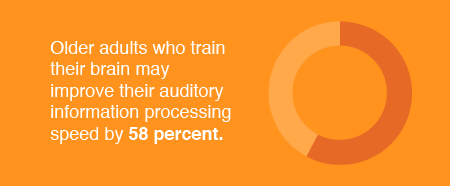
- Do a crossword puzzle. Games that require concentration such as crosswords, Sudoku puzzles, or Lumosity’s programs help take your mind off stress and improve focus.
- Savor the aroma. It’s true: The simple act of smelling your morning coffee can help lower stress.
- Complain some. Don’t like the morning coffee smell? Then whine a bit. Voicing concerns effectively can help your mental health, especially if it leads to results.
- Sleep better. Some scientists say sleep is the single most important health behavior. In fact, skimping on sleep has been linked to everything from obesity to heart disease. It’s easy to overlook, so any little thing that improves the quality of your sleep helps.
- Drink less (or at least drink smarter). Science says boozing can disrupt sleep by preventing chemical interactions that take place during deeper stages of your sleep cycle. In other words, you may fall asleep after a long night out, but the quality of sleep isn’t the same. Similarly, people who sleep less tend to drink more. It’s a vicious cycle. You don’t have to give up drinking completely, but being smart about it could have a huge impact on your sleep.
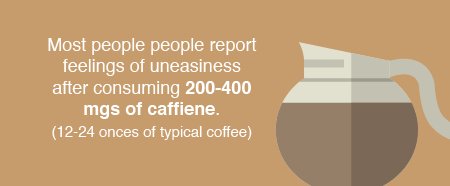
- Cut off caffeine after 2 p.m. It takes a normal person longer than you’d think to digest caffeine. So try to lay off the java, soda, or energy drinks after lunch, or you’ll have an unexpected bedtime boost.
- Avoid screens before bed. Your phone, television, and computer all have screens that emit artificial or blue light. Since we spend 90 percent of our waking hours staring at “glowing rectangles,” that’s definitely a problem. This light suppresses the release of melatonin, which helps you fall asleep. Use a program like f.lux to change your computer’s harsh glow, or plan a time in the evening to put your cell phone to bed.
- Skip the snooze button. I used to be a dedicated snoozer, but then I heard that hitting the snooze button likely disrupts deep REM sleep, leading to less restful sleep and basically making the extra 10 minutes of snoozing anti-productive. If hitting snooze makes me feel more sluggish, count me out.
- Distance yourself from the alarm. If you can’t resist hitting snooze, try moving the alarm clock across the room so you’re forced to get out of bed to turn it off. There are also all kinds of creative, wacky alarm clocks that will fly away, roll around the room, or even force you to put a puzzle together before they stop blaring.
These are some of my favorite health hacks, but that doesn’t mean they’re all right for you or that you have to implement them all right now. Try out the ones that stand out, and come up with your own. As you change your habits, you’ll be more fit, healthier, and happier than you’d ever expect.
What are your favorite health hacks? Let me know in the comments!
Derek Flanzraich is an entrepreneur on a mission to help the world think about health in a healthier way. He is the founder and CEO of Greatist, a media startup working to make healthy living cool.
Try Buffer for free
190,000+ creators, small businesses, and marketers use Buffer to grow their audiences every month.


